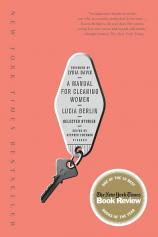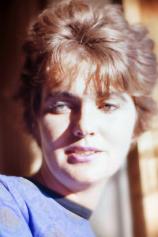Excerpt
Excerpt
A Manual for Cleaning Women: Selected Stories

Angel's Laundromat
A tall old Indian in faded Levi's and a fine Zuni belt. His hair white and long, knotted with raspberry yarn at his neck. The strange thing was that for a year or so we were always at Angel's at the same time. But not at the same times. I mean some days I'd go at seven on a Monday or maybe at six thirty on a Friday evening and he would already be there.
Mrs. Armitage had been different, although she was old too. That was in New York at the San Juan Laundry on Fifteenth Street. Puerto Ricans. Suds overflowing onto the floor. I was a young mother then and washed diapers on Thursday mornings. She lived above me, in 4-C. One morning at the laundry she gave me a key and I took it. She said that if I didn't see her on Thursdays it meant she was dead and would I please go find her body. That was a terrible thing to ask of someone; also then I had to do my laundry on Thursdays.
She died on a Monday and I never went back to the San Juan. The super found her. I don't know how.
For months, at Angel's, the Indian and I did not speak to each other, but we sat next to each other in connected yellow plastic chairs, like at airports. They skidded in the ripped linoleum and the sound hurt your teeth.
He used to sit there sipping Jim Beam, looking at my hands. Not directly, but into the mirror across from us, above the Speed Queen washers. At first it didn't bother me. An old Indian staring at my hands through the dirty mirror, between yellowing IRONING $1.50 A DUZ and orange Day-Glo serenity prayers. GOD GRANT ME THE SERENITY TO ACCEPT THE THINGS I CANNOT CHANGE. But then I began to wonder if he had something about hands. It made me nervous, him watching me smoke and blow my nose, leaf through magazines years old. Lady Bird Johnson going down the rapids.
Finally he got me staring at my hands. I saw him almost grin because he caught me staring at my own hands. For the first time our eyes met in the mirror, beneath DON'T OVERLOAD THE MACHINES.
There was panic in my eyes. I looked into my own eyes and back down at my hands. Horrid age spots, two scars. Un-Indian, nervous, lonely hands. I could see children and men and gardens in my hands.
His hands that day (the day I noticed mine) were on each taut blue thigh. Most of the time they shook badly and he just let them shake in his lap, but that day he was holding them still. The effort to keep them from shaking turned his adobe knuckles white.
The only time I had spoken with Mrs. Armitage outside of the laundry was when her toilet had overflowed and was pouring down through the chandelier on my floor of the building. The lights were still burning while the water splashed rainbows through them. She gripped my arm with her cold dying hand and said, "It's a miracle, isn't it?"
His name was Tony. He was a Jicarilla Apache from up north. One day I hadn't seen him but I knew it was his fine hand on my shoulder. He gave me three dimes. I didn't understand, almost said thanks, but then I saw that he was shaky-sick and couldn't work the dryers. Sober, it's hard. You have to turn the arrow with one hand, put the dime in with the other, push down the plunger, then turn the arrow back for the next dime.
He came back later, drunk, just as his clothes were starting to fall limp and dry. He couldn't get the door open, passed out in the yellow chair. My clothes were dry, I was folding.
Angel and I got Tony back onto the floor of the pressing room. Hot. Angel is responsible for all the AA prayers and mottoes. DON'T THINK AND DON'T DRINK. Angel put a cold wet one-sock on Tony's head and knelt beside him.
"Brother, believe me ... I've been there ... right down there in the gutter where you are. I know just how you feel."
Tony didn't open his eyes. Anybody says he knows just how someone else feels is a fool.
Angel's Laundromat is in Albuquerque, New Mexico. Fourth Street. Shabby shops and junkyards, secondhand stores with army cots, boxes of one-socks, 1940 editions of Good Hygiene. Grain stores and motels for lovers and drunks and old women with hennaed hair who do their laundry at Angel's. Teenage Chicana brides go to Angel's. Towels, pink shortie nighties, bikini underpants that sayThursday. Their husbands wear blue overalls with names in script on the pockets. I like to wait and see the names appear in the mirror vision of the dryers. Tina,Corky,Junior.
Traveling people go to Angel's. Dirty mattresses, rusty high chairs tied to the roofs of dented old Buicks. Leaky oil pans, leaky canvas water bags. Leaky washing machines. The men sit in the cars, shirtless, crush Hamm's cans when they're empty.
But it's Indians who go to Angel's mostly. Pueblo Indians from San Felipe and Laguna and Sandia. Tony was the only Apache I ever met, at the laundry or anywhere else. I like to sort of cross my eyes and watch the dryers full of Indian clothes blurring the brilliant swirling purples and oranges and reds and pinks.
I go to Angel's. I'm not sure why, it's not just the Indians. It's across town from me. Only a block away is the Campus, air-conditioned, soft rock on the Muzak. New Yorker, Ms., and Cosmopolitan. Wives of graduate assistants go there and buy their kids Zero bars and Cokes. The Campus laundry has a sign, like most laundries do, POSITIVELY NO DYEING. I drove all over town with a green bedspread until I came to Angel's with his yellow sign, YOU CAN DIE HERE ANYTIME.
I could see it wasn't turning deep purple but a darker muddy green, but I wanted to come back anyway. I liked the Indians and their laundry. The broken Coke machine and the flooded floor reminded me of New York. Puerto Ricans mopping, mopping. Their pay phone was always out of order, like Angel's. Would I have gone to find Mrs. Armitage's body on a Thursday?
"I am chief of my tribe," the Indian said. He had just been sitting there, sipping port, looking at my hands.
He told me that his wife worked cleaning houses. They had had four sons. The youngest one had committed suicide, the oldest had died in Vietnam. The other two were school bus drivers.
"You know why I like you?" he asked.
"No, why?"
"Because you are a redskin." He pointed to my face in the mirror. I do have red skin, and no, I never had seen a red-skinned Indian.
He liked my name, pronounced it in Italian. Lu-chee-a. He had been in Italy in World War II. Sure enough there was a dog tag with his beautiful silver and turquoise necklaces. It had a big dent in it. "A bullet?" No, he used to chew it when he got scared or horny.
Once he suggested that we go lie down in his camper and rest together.
"Eskimos say laugh together." I pointed to the lime-green Day-Glo sign, NEVER LEAVE THE MACHINES UNATTENDED. We both giggled, laughing together on our connected plastic chairs. Then we sat, quiet. No sound but the sloshy water, rhythmic as ocean waves. His Buddha hand held mine.
A train passed. He nudged me: "Great big iron horse!" and we started giggling all over again.
I have a lot of unfounded generalizations about people, like all blacks are bound to like Charlie Parker. Germans are horrible, all Indians have a weird sense of humor like my mother's. One favorite of hers is when this guy is bending down tying his shoe and another comes along and beats him up and says, "You're always tying your shoe!" The other one is when a waiter is serving and he spills beans in somebody's lap and says, "Oh, oh, I spilled the beans." Tony used to repeat these to me on slow days at the laundry.
Once he was very drunk, mean drunk, got into a fight with some Okies in the parking lot. They busted his Jim Beam bottle. Angel said he'd buy him a half-pint if he would listen to him in the pressing room. I moved my clothes from the washer to the dryer while Angel talked to Tony about One Day at a Time.
When Tony came out he shoved his dimes into my hand. I put his clothes into a dryer while he struggled with the Jim Beam bottle cap. Before I could sit down he hollered at me.
"I am a chief! I am a chief of the Apache tribe! Shit!"
"Shit yourself, Chief." He was just sitting there, drinking, looking at my hands in the mirror.
"How come you do the Apache laundry?"
I don't know why I said that. It was a horrible thing to say. Maybe I thought he would laugh. He did, anyway.
"What tribe are you, redskin?" he said, watching my hands take out a cigarette. "You know my first cigarette was lit by a prince? Do you believe that?"
"Sure I believe it. Want a light?" He lit my cigarette and we smiled at each other. We were very close and then he passed out and I was alone in the mirror.
There was a young girl, not in the mirror but sitting by the window. Her hair curled in the mist, wispy Botticelli. I read all the signs. GOD GIVE ME THE COURAGE. NEW CRIB NEVER USED-BABY DIED.
The girl put her clothes into a turquoise basket and she left. I moved my clothes to the table, checked Tony's, and put in another dime. I was alone in Angel's with Tony. I looked at my hands and eyes in the mirror. Pretty blue eyes.
Once I was on a yacht off Viña del Mar. I borrowed my first cigarette and asked Prince Aly Khan for a light. "Enchanté," he said. He didn't have a match, actually.
I folded my laundry, and when Angel came back I went home.
I can't remember when it was that I realized I never did see that old Indian again.
Copyright © 1977, 1983, 1984, 1988, 1990, 1993, 1999 by Lucia Berlin
Copyright © 2015 by the Estate of Lucia Berlin
A Manual for Cleaning Women: Selected Stories
- Genres: Fiction, Short Stories
- paperback: 432 pages
- Publisher: Picador
- ISBN-10: 1250094739
- ISBN-13: 9781250094735



